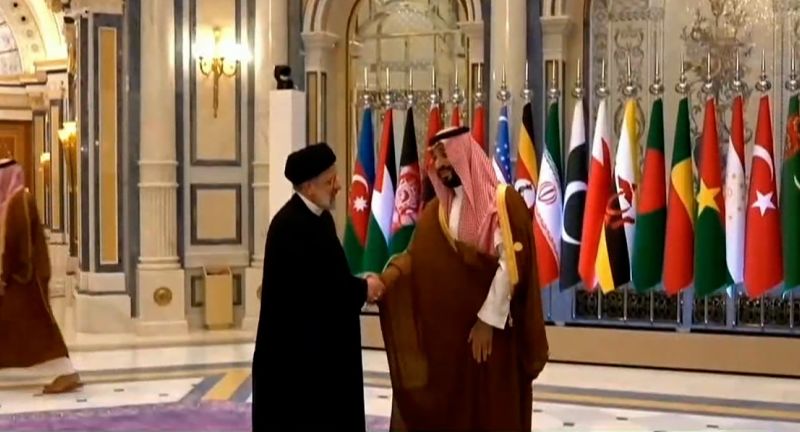
Saudi-hosted summit condemns Israel as Iran leader pays rare visit
Arab and Muslim leaders decried Israeli “war crimes” in Gaza at a summit in Riyadh where Iranian President Ebrahim Raisi met Saudi Crown Prince Mohammed bin Salman in a first public meeting.
The extraordinary summit, which gathered 57 leaders, demanded that the UN Security Council take a “decisive and binding decision” to impose a cessation of aggression with fighting deep in Gaza underway between Israel and Hamas.
“We condemn the Israeli aggression against the Gaza Strip, the war crimes and the barbaric, brutal and inhumane massacres committed by the colonial occupation government against the Palestinian people, including in the occupied West Bank and East Jerusalem. We demand it be stopped immediately,” the final resolution said.
The summit rejected the characterization of this “war of revenge as [one of] self-defense” and demanded the entry of humanitarian aid convoys.
“Protection from cycles of violence and wars will not be achieved without ending the Israeli occupation… we hold Israel, the occupying power responsible for the continuation and aggravation of the conflict as a result of its aggression against human rights,” the resolution added.
Israel launched its offensive after surprise, cross-border attacks by Hamas left 1,200 people dead and took hostages.
The summit marks the first trip by an Iranian leader to Saudi Arabia in 11 years after the two countries restored diplomatic relations in March.
Raisi shook hands with Saudi Arabia’s Crown Prince Mohammed bin Salman (MBS), the heir to the Saudi throne and the country’s de facto ruler.
Iran is the principal backer of Lebanese armed group Hezbollah, which has been engaged in daily cross-fire with Israeli forces on Israel’s northern border with Lebanon. It also backs Yemen’s Houthi rebels, who have been firing missiles towards Israel, and maintains strong ties with Hamas.
Speaking at the summit, Raisi said that all attendees had gathered there on behalf of the Islamic world to “save the Palestinians.”
“We have gathered here today to discuss the focus of the Islamic world, which is the Palestinian cause, where we’ve witnessed the worst crimes in history…Today is a historic day in the heroic defense and support of Al-Aqsa Mosque,” he added.
In his opening remarks, MBS said the Kingdom “categorically rejects” the war to which Palestinians are being subjected.
“This summit is being held under exceptional and painful circumstances,” he said.
“We categorically reject this brutal war that our brothers and sisters are being subjected to in Palestine… we renew our demand for an immediate cessation of military operations.”
Palestinian Authority President Mahmoud Abbas said the US “bears responsibility for the absence of a political solution” as it has the most influence on Israel.
Syria’s leader also attends
Syrian President Bashar al-Assad also attended the summit, a further sign of Syria’s rehabilitation among Arab states, following his participation at a regional meeting in May.
In his remarks, Assad criticized normalization agreements between Arab countries and Israel. “More hands extended by us equals more massacres against us … what we have to do to help Palestine is use actual political tools, not rhetorial tools, and that firstly is stopping any political process with the Zionist entity,” he said.
The remarks by Assad – who is also accused of committing war crimes during his country’s civil war – may have been swipe against normalization talks between Saudi Arabia and Israel.
That dialogue, brokered chiefly by the US, was at an advanced stage when it was scuttled by the eruption of the Hamas-Israel war.
Qatar’s head of state, Emir Tamim bin Hamad Al Thani, also criticized the international community for failing to “stop war crimes and massacres” in Gaza.
“We wonder how long will the international community continue to treat Israel as if it is above international law, and how long will it be condoned to flout all international laws in its brutal, never-ending war on the country’s indigenous population,” said Al Thani.
The gas-rich country has brokered indirect negotiations between Hamas and Israel over the release of Israeli hostages held by Hamas, humanitarian aid into the besieged Gaza strip, as well as a possible ceasefire.
